At Pilgrims we help to ensure that children participate in regular exercise, with the aim of making sure that our children continue their love of physical activity into the next stage of their school journey and then into adult life. Here, our enthusiastic Specialist Tennis and PE Coach, Mr Woolf from ‘Woolfy Tennis’ explains why taking part in exercise and physical activity is so beneficial to the children.
The children at Pilgrims are all at crucial stages of their growth, so it is important that they lead healthy lifestyles. The more physical activity a child participates in when they are young, the more likely they will continue as they get older.
Exercise not only helps children to look after their physical health and fitness, but it also benefits mental health. Physical activity reduces anxiety, helps children to pay better attention at school and promotes good sleep, which is critical for brain development. So, all in all, exercise helps children to get the most out of school!
Therefore, sport is a very important part of school life for the children at Pilgrims. We want all of the children to enjoy sports and so we teach them healthy competition, but also that having fun is not all about winning, it’s about taking part.
Some children naturally enjoy taking part in sports activities, while others may need some encouragement to participate in physical activity. At Pilgrims the staff know how important it is to find something that the children enjoy in order to encourage movement.
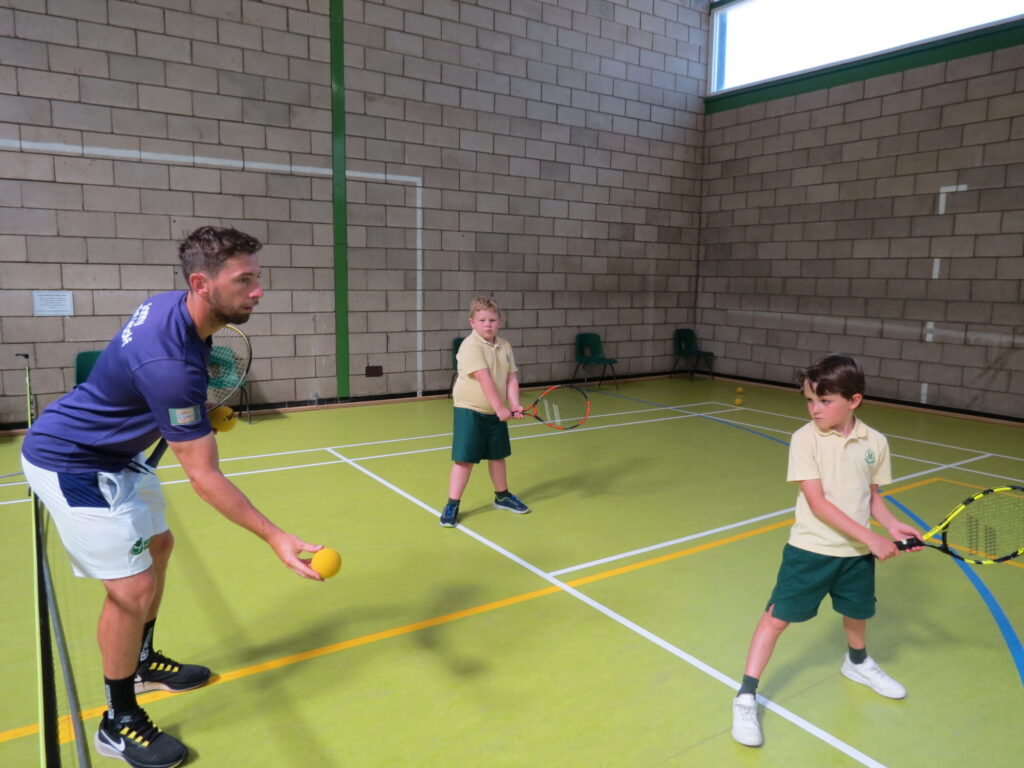
One idea for you to do at home is to take regular trips to the park or open spaces and play catch or tag with them. We also encourage the children to walk, cycle or scoot to school wherever possible.
Parents and caregivers can also be a role model for the children by taking part in physical activity themselves – active parents tend to raise active children! For some inspiration of exercise to do at home with the whole family, head to the ‘Pilgrims at Home’ page on our website and join in with the ‘Workout with Woolfy’ video!
As school has reopened and pupils have settled back into the classroom again, Mrs Webster, Headteacher at Pilgrims School, explains how Pilgrims adapted to deliver a full and rich curriculum while pupils were learning from home and how the school has ensured that children were provided with a happy and welcoming environment on their return.
After learning from home for the second time in the space of a year, we have made it a priority to ensure that everyone settled back in comfortably and enjoyed being back in their school environment.
The children have transitioned between learning from home and learning in the classroom in such a positive manner. And, of course, they have been so excited to meet up with friends again, some of whom they hadn’t seen since Christmas.
Positive minds both inside and outside the classroom
Since welcoming back all our little people, our main focus has been ensuring the children feel happy and safe. We have focused on reducing anxiety and ensuring both children and parents are aware of how the school has adapted and is operating safely.
As a school, we also work closely with the Making Me charity and we will be holding a special Children’s Mental Health Week early in the summer term. The week will provide the children with lots of opportunities to express their feelings – whether through stories, pictures or games – telling us what they can do, what they like to do most and also what they would like to learn to do next. Something for grow-ups to think about too!
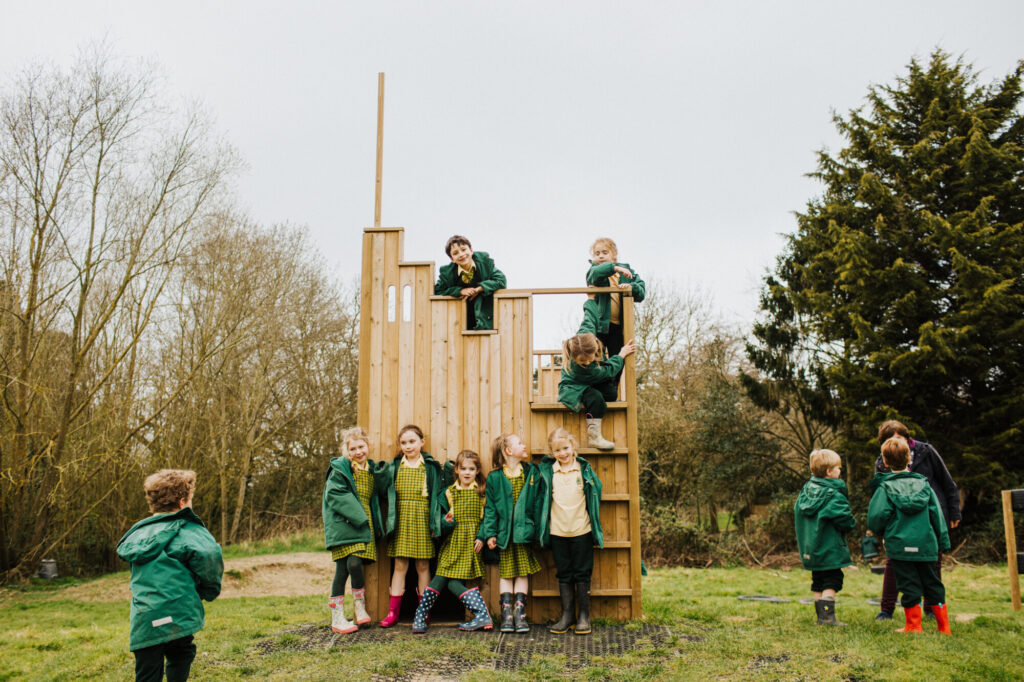
One of our school values is ‘curiosity’ and outdoor learning is a valuable tool for the children at Pilgrims, especially as the weather improves.
As part of their summer term topic, ‘Stick Together’, our Year 1 children will be spending their entire first day back at school on the field! They will discover what creatures live in our pond, learn to identify the plants and trees around them, take part in team-building games , create dens using whatever they can find in the woods and lots more.
Outdoor learning not only enables pupils to be curious, but it also encourages imagination and creativity, which in turn enables the children to flourish.
I hope that the children all have a lovely, well-deserved Easter break and we look forward to seeing them again in the summer term.
If you want to find out more about our school, head to our Open Day page to see how we engage and inspire each child to unearth their individual interests and talents at Pilgrims.
If you had a time machine where would you go? Into the past or straight to the future? To mark ‘Pretend to be a Time Traveller Day’, our Headteacher Mrs Webster looks at the power of the imagination.
One of our core values at Pilgrims is curiosity, so on this Pretend to be a Time Traveller Day, we would like to encourage the children to wonder about what life might be like living in a different time or place.
Learning about history is important for children because it enables them to develop better understanding of the world in which we live. Building knowledge and understanding of historical events also helps them develop a much greater appreciation for current events today.
This term the Year 1 children ‘travelled back to the medieval times’ for the topic ‘Oh what a knight!’ and there has been much excitement about castles, dragons, princesses and knights.
Why not try one of the following fun activities with your child:
- Train a pet dragon
Imagine you have found a dragon’s egg – you need to build a nest to protect it and wait for it to hatch. Once it has hatched you need to build trust by regularly feeding him from your hand. Next, you can start to train him to fly and breathe fire! Flap your arms, run and jump, then take deep breaths and blow to show your pet dragon how it is done. You have now trained your own pet dragon!
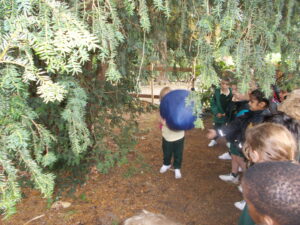
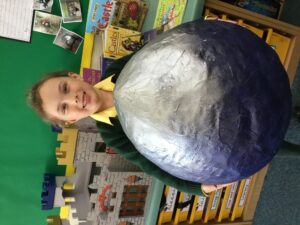
- Build a castle
Find a cardboard box and build your dream model castle. Make sure it has a moat, a drawbridge and ramparts. The moat stops your enemies from entering the castle and the drawbridge allows your friends to come in. Decorate it in true medieval style with knight armour and a throne. Then mark it with a personalised flag and become king of the castle!
- Become a knight
Knights were warriors who had good manners and were always dressed well. As a knight, you own a horse and protect important people. You need a sword and a shield and some heavy metal armour. Make sure you have all of your kit and then go and fight off your enemies and protect your loved ones from danger!
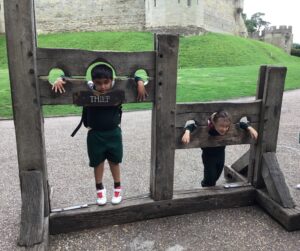
- Become a princess
Princesses were surrounded by beautiful things and wore glamorous dresses. To be a princess use your kindness, manners, courage and intelligence to inspire others. Be graceful, true to yourself and give others the royal treatment. Next, imagine you have been locked in a tower not knowing how to get out. Will a brave knight come and save you, or will you save yourself?
Looking ahead
As well as a trip to the past, we would like to encourage the children to look ahead to the year 2021 and beyond.
In the last year our children have experienced uncertain times and there are still restrictions in place at home and in school that prevent them doing many things they used to take for granted.
So why not time travel into the future and look at what you want to do as soon as you can?
Here are some ideas:
- Visit family and friends in person
Throughout 2020, we have all spent lots of time video calling, voice messaging and contacting our family and friends through online messaging. While we are thankful to have the technology which has enabled us to keep in touch with loved ones throughout the year, nothing can replace the simple joy of human contact. I know I am looking forward to being reunited with my family and friends!
- Celebrate!
Throughout the year there will have been lots of special events and important occasions, such as birthdays, arrival of new family members or personal achievements, that will have been cancelled, postponed or celebrated differently. The children might want to celebrate and mark these occasions once the restrictions are lifted.
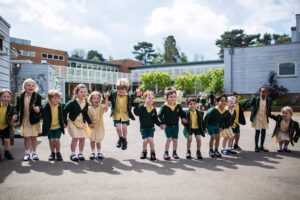
- Go on holiday or a short break
Travel both in and outside of the UK has been restricted throughout 2020 and the four walls of our homes have become very familiar. Once these restrictions are lifted, the children might appreciate a change of scenery, whether this is a break in the UK or abroad.
- Go for a day out
It is no secret that children enjoy a day trip, whether that involves heading to the zoo, the cinema, a museum or a soft play centre. While some of these have been open at points during the COVID-19 pandemic, there have also been restrictions in place.
If you need any guidance or support in relation to the coronavirus pandemic, please go to https://www.pilgrims-school.info/school-life/covid-19/. If you have a query that is not covered on the coronavirus webpage, please call or email Jo Webster or Lucy Nightingale. You can also email enquiries@pilgrims-school.org.uk.
Kindness goes a long way. To mark World Kindness Day 2020, our Headteacher, Mrs Webster, discusses why kindness is so important for the children at Pilgrims.
At Pilgrims, being kind and compassionate towards each other is just as important as education, which is why we encourage the children to work together to help and support each other.
We recognise that the early years of education are an important part of life because little people start learning from birth. The values that children learn in this time build the foundations for children to create their own character and ethos that stays with them for life.
As adults and role models, we believe it is our responsibility to inspire kindness in our pupils and to teach them that no act of kindness is ever too small.
This is why kindness is one of our core values at Pilgrims – “We treat everybody in a kind, compassionate, caring and supportive way so that everybody feels happy and safe.”
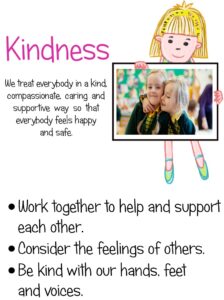
Kindness Award
We also have a special ‘Kindness Award’ which is given out each term to a child who has demonstrated an act of kindness above and beyond. The award was established and named after one of our teachers, Linda Hewitt, who sadly passed away. The children are aware of how special the award is, so they look after it well before it is ready to be passed on to the next person.
A wonderful example of one of these special acts of kindness was when one of our Year 1 pupils saw that a girl in Reception was anxious about going to our after-school club, Owls, for the very first time. Unprompted, the Year 1 pupil immediately went over and gave the Reception girl a hug, reassuring her that everything would be OK and that she was there for her if she needed anything whilst she was in Owls. How wonderful it was to watch as the nervous girl started to smile and happily walked into Owls.
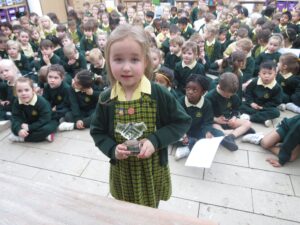
And with the current coronavirus pandemic filling our thoughts each day, it is important for the children to find lots of different ways to show that they can be kind and consider the feelings of others.
The simple act of saying hello when you walk past people or saying please and thank you in conversation are examples of kindness that will come naturally to children the more they are practiced. We encourage the children at Pilgrims to praise their friends, to tell them something they like about them or invite a new friend to join in with their game.
Outside of school, children can chalk a picture outside their house for people to walk past or paint some pebbles and leave them around the area. This will brighten people’s day as they walk past or find the pebbles.
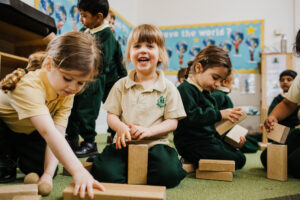
We don’t know what battles other people are facing privately, so acts of kindness, no matter how small, can have a significant impact on someone’s day and a positive effect on mental health.
Even in the middle of a pandemic, there are still ways for the children to be kind to each other and kindness is contagious. So, this World Kindness Day, encourage your children to be kind with their hands, feet and voices and to carry out at least one act of random kindness.
If you need any guidance or support in relation to the coronavirus pandemic, please visit our COVID-19 page.
If you have a query that is not covered on the coronavirus webpage, please call or email Jo Webster or Lucy Nightingale. You can also email enquiries@pilgrims-school.org.uk.
It’s the beginning of a brand-new academic year here at Pilgrims. From discovering dragon eggs on the field to finding out about the different jobs people do, Pilgrims’ headteacher Mrs Webster explains what fun things the children will be getting up to over the coming months.
After months of home-learning and not being able to see our friends, it’s great that we’re all allowed back in school to start the new academic year together. Although we are still social distancing and making sure we keep the classrooms clean and wash our hands regularly, we’re really enjoying being back at school and we have lots of exciting things to learn over the coming weeks.
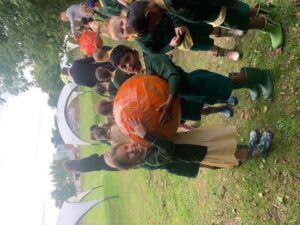
Reception
Reception have started the year by talking about ‘me and my world’. Children are working together and learning all about sharing and taking turns, which is particularly important after being at home for so long during lockdown.
Learning about numbers, writing simple sentences and understanding daily routines are also some of the skills pupils will be developing this term.
We are very excited to be finding out about our family, jobs and reading books about seasons and Christmas, while watching Autumn Watch on BBC to learn more about nature and wildlife.
The teachers have also arranged ‘visits’ from some other parents and members of the local community to take place via Zoom, so the children can ask questions about their jobs!
Year 1
Meanwhile, in Year 1, the theme this term is ‘Oh what a knight!’ which means building drawbridges, investigating dragons and writing to a princess all form part of the school day.
We’re excited to find out about castles, dragons and knights and use our imagination to become a good knight and help rescue the princess (or help the princess rescue herself!).
Perhaps you could spend some time over half term visiting a real-life castle or building a model castle to keep the princess safe? There are also lots of interesting books to read including the Secret World of Castles and the Princess and the Pea!
Year 2
In their final year at Pilgrims, the children will be learning about the Arctic and the Antarctic as part of their ‘Pole to Pole’ topic; which animals live there? do polar bears live next to penguins? do humans live there? what do their houses look like? The children have already created their very own ‘Inukshuks’ – a cultural Inuit art tradition from the Arctic. The children made them using clay and, outside, using real stones.
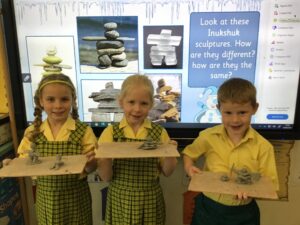
Getting used to being back at school
We understand that some children may be finding returning to school particularly scary. This is why we’re making sure we make their experience is as normal as possible, so they don’t become overwhelmed or uncomfortable.
Beyond the classroom the children will return to their swimming, games and PE sessions and also enjoy some lessons outside in our purpose-built, outdoor classroom.
Staff will continue to remind children about the importance of keeping classrooms and equipment clean and practicing personal hygiene, so we keep ourselves, our friends and our families safe.
A copy of our coronavirus risk assessment can be found here: https://www.pilgrims-school.info/school-life/covid-19/
To mark ‘International Friendship Day 2020’, our Headteacher, Mrs Webster, discusses why friendship is so important for the children here at Pilgrims.
Friendship plays a crucial role in leading a happy and healthy life for people of all ages, but it is especially important for children as it helps them to learn and develop new life skills.
Being kind to each other and making friends here at Pilgrims is just as important as education, which is why we encourage considerate and compassionate behaviour both in and out of the classroom. Friendships develop trust and create a world where everyone can be united and supportive of each other.
Building friendships requires empathy and concern for other people. By valuing friendship, children adopt these characteristics and embrace a more selfless and grateful approach to life. After all, friends are there to offer encouragement and support in tough times and share life experiences in the fun times too.
Friendship can also improve emotional and social development, increase self-confidence, improve communication skills and reduce anxieties and stress.
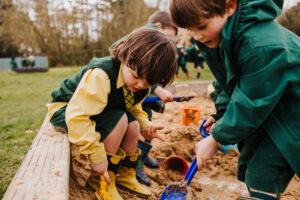
Did your children miss their friends during lockdown?
I certainly missed all of the children and it was great to have all of the year groups back before the summer break, even if it was only for a short period. I think we can all agree that being away from our friends during lockdown has made us realise just how important friendship is and why we all love being at school and seeing our friends every day!
Although it is not possible for the children to hug each other or share toys right now, it is still possible to have fun and play safely together. This lovely video explains to children how they can still show each other that they care and cherish each other’s friendships while social distancing:
What can your children do to nurture their friendships?
Children can nurture friendships by spending quality time together, both in person and virtually. Children tend to form friendships with others that have similar interests to them, so if they can, try and help them to participate in activities they enjoy together during the holidays. These can include going for socially distanced walks, visits to the park or even a back-yard BBQ!
If it is not possible for your children to see their friends, then you can encourage them to keep in touch online, over the phone or by video calls. This is a great way for children to improve communication skills and express their excitement while they share with each other what they have been doing in the summer holidays.
Other ways for your children to show friends that they care include making a card or some artwork to send to them, making a friendship bracelet or other keepsake or writing a list of everything that they love about their friends and sharing it with them. These activities show friends that your child is thinking of them and values their friendship, even when they are not physically there.
So, this International Friendship Day, help your children use this opportunity to celebrate the important people in our lives and consider how they make our own lives better.
As thousands of children return to the classroom this week after a long spell in lockdown, Mrs Webster, Headteacher at Pilgrims School explains how the youngsters – and their teachers – have taken it all in their stride.
There has been much made of the Government’s decision to reopen schools this week to certain age groups – attending alongside those Key Worker children who have been in school since the start of the lockdown period.
But despite the debate, and once we were given the go-ahead to reopen, there has been no doubt in the minds of our staff that we could – and would – provide children with a happy and welcoming reception when they walked back into the school playground for the first time.
Colourful bunting was erected to create zones where the children could play, gazebos provided shelter on the field so classes could be taught outside and decking areas were extended out from each classroom to give the children additional space.
One of the main concerns about school’s reopening has been how to implement socially distancing, with such young children.
Obviously, staying two metres away from everyone else is a lot to ask of our very little people. However, our staff have been extremely creative with ways to encourage the children to play at increased distances from each other.
Each classroom has a reduced number of children and they remain in their set “bubble” throughout the day which restricts who they mix with. They also have set play areas to stay within during break times – one for each bubble.
Snacks and meals are brought to the classroom so the children do not have to flow around school as much as they used to. And, if they do, they follow arrows which have been added to the floor.
You might imagine that such new additions to daily life would increase the potential for anxiety among the children but we have found the opposite to be true. It just feels like a new ‘game’ to them.
What’s more, we had totally under-estimated just how excited the children would be to see friends again and their happy smiles and energetic waving lifted us all after such a long period of separation.
Since our return on Monday the main focus in lessons has been making sure the children are happy and feel safe.
This started with ensuring their parents were aware of what was expected and how the school would operate so they could discuss this with their family and make informed decisions.
Mrs Webster and Mrs Quince then put together a ‘Welcome Back’ video which parents and the children could view before returning so that everyone could take on board the new arrangements.
Our Pastoral & SEND Co-Ordinator is in school and always available to those children who may need additional encouragement or support. However, so far, the children are just so happy to be back learning alongside their friends.
Feedback from parents has been overwhelmingly positive and staff have been praised for the welcoming and smooth start to what has become a “new normal”.
This feedback has been really important to the staff who have worked so hard throughout the lockdown – and who continue to do so – and we are extremely grateful to all of you who have taken the time to send words of encouragement.
The entire school staff have pulled together during this period (whether from home or in school) to keep Pilgrims open for key worker families, provide home learning to children remaining at home and prepare to reopen safely.
And we are thrilled to see that, even with restrictions in place, Pilgrims still feels like Pilgrims.
At Pilgrims School, the mental health and wellbeing of our pupils is just as important as their education. Here, Headteacher Mrs Webster explains why they’re working alongside The Mind Map charity to provide support for children and parents during this difficult time.
Coronavirus is something that didn’t exist a year ago. And we, as adults, don’t fully understand it – so how can we expect children to? A few months ago, the children’s usual routine completely changed and we are very mindful of the effects that this dramatic change can have on young children.
We have worked closely with The Mind Map over the last two years to introduce a Well-Being and Resilience programme within the school. We had already introduced new initiatives to encourage children to talk about their feelings, we keep parents up-to-date by running assemblies and workshops and work alongside teachers and staff to ensure we are providing the correct support to those children who need it, where necessary.
During this period of uncertainty, they have now provided parents with lots of tips and advice on how to manage anxiety and worry which we share via our weekly newsletters. Our Pastoral & SEND Co-Ordinator, Mrs Morales, has her own ‘Well-Being Blog’ within these newsletters and they are proving extremely popular with both parents and their children.
Some of the suggestions so far have included making a ‘Worry Box’ to store children’s worries and allocating a certain time each day to discuss these, as well as reading books and articles like Molly Watts’ ‘Dave the Dog is worried about Coronavirus’ to help them to better understand what’s going on.
It’s also important to spend as much quality time as possible as a family, and enjoy doing activities together in the evenings and at weekends.
One of the best ways to help with mental health is going for regular walks – as the fresh air is great for taking your mind off things and lifting your mood. Why not take your child’s learning into the garden, if the weather is nice?
We miss you!
The lockdown has meant that virtual learning has replaced our normal school curriculum over the last few months and although this means we are spending extra time with our families, we are missing all our friends and teachers.
Following the Government’s recent announcement about re-opening schools, we are working hard to ensure we can deliver a safe and secure environment to do this, in line with the guidance provided. We hope it won’t be long before we can welcome our families back to Pilgrims, albeit in a slightly different way.
In the meantime, if you have any questions or need any advice about how to talk to your children about coronavirus, please visit the coronavirus page on our website. This contains useful downloads, advice and tips as well as some activity ideas to enjoy in your free time while in lockdown.
The ongoing coronavirus pandemic means that Easter weekend will be spent at home this year, but there’s still lots of family fun to be had. Here our Headteacher, Mrs Webster, shares some activities to enjoy during the Easter break.
We know that explaining to children that they can’t leave the house can be very difficult so it’s important to keep them entertained with fun activities to enjoy at home.
Learning through play
At Pilgrims, we believe that every day is a learning day and learning through Easter play is a great way to keep pupils’ knowledge expanding, while having fun.
Baking is a great way to incorporate maths into a family activity while you weigh out the ingredients together. The best part is that you can enjoy eating it together when you’ve finished! Why not try making our pear and chocolate crumble for after your Easter lunch?
While your crumble is in the oven, you could take some time to read a book together or head over to David Walliams’ website to listen to his audio stories.
You could also do some arts and crafts such as creating your own Easter egg design, making bunny ears using recycled cereal boxes or Easter baskets using recycled yogurt pots and ribbon. Don’t forget to decorate them with paint, stickers and materials you can glue on. Don’t be afraid to get messy!
If the weather permits, why not use your daily exercise to head out for a walk to spot the signs of spring? Look out for daffodils and butterflies while listening for the buzz of the bumblebees. Or if you are looking for exercises to do in the house or garden, Joe Wicks is holding live PE lessons every weekday at 9am on YouTube, although you can catch up with them any time.
Remember, an Easter egg hunt proves that your children can find anything if they really want to! A fun idea could be to make some clues to get your kids puzzling over where to find the next pointer around the house and in the garden, eventually leading to their Easter treats.
Share the fun
We’d love to see what you are up to over Easter, so why not share your pictures into the closed Facebook group? Or if you are happy to have your photos shared, send them to our public Facebook and Twitter pages.
It’s so important to keep yourselves and your loved ones safe right now, so please make sure you are only spending time with the people you live with during this time. For more information on how to talk to children about the virus and details about our remote learning, go to the coronavirus page on our website.
We hope you all have a lovely Easter and we can’t wait to see how much fun you are having at home!
